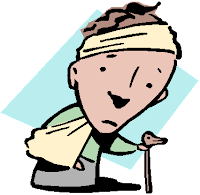These days so many novels feature a character getting
injured or struck with a medical condition. I used to teach an online class with
a nurse practitioner friend called Medical Speak for Writers because we thought
it was important to get the facts straight. Whether you write medical romances
or any other sort of book, chances are at some point, you will write an injury,
disease or condition into one of your books.
A writer often has to work backwards when it comes to
diseases and injuries. We probably have a certain outcome in mind when our hero
or heroine is shot or stabbed. Therefore we must learn where their wound should
be on the body for the desired outcome. In the case of one of my recent WIPs, I
wanted the elderly woman to have dementia, but not all the time. I wanted her
to grow progressively sicker.
In order to get the details right, I used several online
resources that are readily available. But which sites can you trust? So we
developed a list of the most trusted sites for accurate medical information for
the class. Here are some of our top picks:
http://www.mayoclinic.com/
- Mayo Clinic site for diseases and conditions, symptom checker (see below),
listing of medical tests, first aid procedures and more.
http://www.webmd.com/ - Web MD, top source for accurate info on all
sorts of medical conditions, first aid and emergency care, medications and
mental health.
http://www.cnn.com/HEALTH/
- CNN’s page for health news also has information on various more common
diseases and conditions.
http://health.nih.gov/
- Part of the government sponsored site for the National Institutes of Health.
As well as information on many medical conditions, you can also find out about
ongoing research and grant programs. An interesting link will take you to
minority-specific health sites, something we did not see anywhere else.
http://toxnet.nlm.nih.gov/
- Another government sponsored site but this one allows you to research various
poisons and their effects.
http://cdc.gov/ - Yet another
government resource. This site allows you to research rare diseases found in
all corners of the world.
http://symptoms.webmd.com/
- Do you want to plug in symptoms and find a condition that fits? Symptom
Checker from Web MD is a lifesaver when you need your character to have
specific symptoms. Just plug in the information and the site will give you a
list of conditions that match.
http://www.drugs.com/pdr/
- Physician’s Desk Reference. The online consumer version of the medical bible
of pharmaceuticals is written in layman’s terms. Features a section to help
identify pills, a drug interaction calculator, drugs by condition and possible
side effects.
http://i.nursegroups.com/nursing-article/medicine-through-time.html
- Medicine Through Time. Details different time periods in history and tells a
bit about the medicine available and the practices used at various points in
history.
You will also find many sites sponsored by foundations for
various conditions. For example, searching “breast cancer” will yield many millions
of sites. This is why it’s good to stick to only a few trusted sites for your
information. There’s so much misinformation out there, why risk making a
factual error?
Of
course, as writers, we always have the option of making up a disease, condition
or a type of poison, depending on what type of story we are writing. I read a
futuristic romance years ago where the main character was injecting her victims
with a drug that incapacitated them. In such a story, it’s easy to get away
with creating a drug if it’s part of your world building, for example. But if
you are going for realism, accuracy is a must. The moment a reader or editor
catches a factual error, you lose all credibility and risk losing that reader.
Do you have any other sites you use
for this type of info that you could add to the list? Please share.
Wynter Daniels has authored more than three dozen romances,
including contemporary, romantic suspense, and paranormal romance books for
several publishers including Entangled Publishing and Carina Press. She lives
in sunny Florida with her family and a very spoiled cat. You can find her on the web on Facebook,
Twitter and her website.








9 comments:
I'm already eyeing that site with all the poisons--for my next book of course!
Wonderful resource list. Thanks for sharing. You've already listed my "go to" sites. I'm pretty sure my brother-in-law the doctor would prefer I not include his contact information. ;)
Thank you for all the resources! Those will come in handy. ;)
Cool info, Wynter. Thanks!
Ha ha, Cathy. Sure you don't want to share your BIL's info?
Hope it helps, Anne Marie!
You are so welcome, Marcelle. I've used most of the sites more than once myself.
For Alzheimer's disease and other dementia,I would add www.alz.org and caringkindnyc.org
Great post, Wynter. It's so true that we abuse them. I wish we could recuperate as quickly as our characters!
LOVED this! Sorry I came late to the party. You do need to be careful. If I have to rely on the net I generally make sure three sites agree. Plus, people can react differently to poison, by gender, age, and size. Hmm. Yes I do research poisons.;-) Plants are really interesting.
Thanks for those, Elise.
Yeah, that would be nice, Maureen, wouldn't it?
Good point, Rita. Spider venom is interesting too. Oh, what people would think if they checked my internet searches, LOL!
Post a Comment